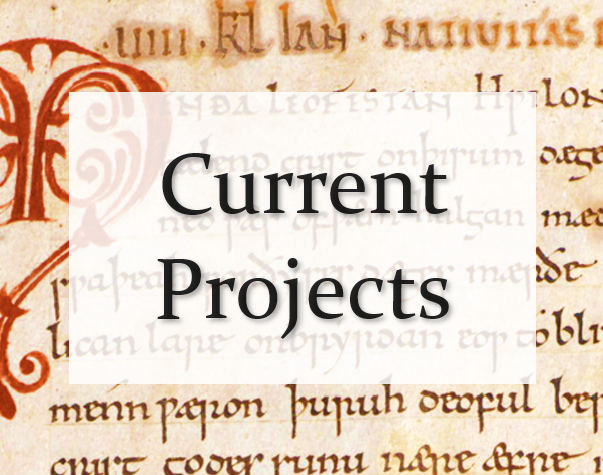Digital Humanities
The TFED Aelfric Scriptorium Project
The TFED Aelfric Scriptorium Project (TASP) makes scholarly contributions to medieval and classical studies through the publication of digitalized editions, transcriptions, translations, commentaries, and glossaries.
Who We Are:
The Transatlantic Forum for Education and Diplomacy (TFED), a 501©(3) educational nonprofit, sponsors research in the digital humanities as part of its mission to bridge the worlds of international diplomacy and higher education, with particular focus on transatlantic relations and the role of the humanities in fostering cultural literacy and global understanding.
Our Background:
The TFED Aelfric Scriptorium Project (TASP) takes its name from the learned scholar and theologian Aelfric (also known as Aelfric of Eynsham or Alfricus Grammaticus), who flourished around the year 1000 AD. Just as Aelfric worked to spread learning throughout early medieval England, TASP seeks to create a 21st-century digital scriptorium that will provide digital access to medieval and classical texts so that they may be more easily studied by students, scholars, and the general public.
Our Goals:
Our team is creating a digital scriptorium to house, preserve, and publish medieval and classical texts, with a primary focus on literary, historical, and theological works. We emphasize the visual aspects of early manuscripts by making use of Edition Visualization Technology (EVT), an open-source tool designed to create digital editions from XML-encoded texts. Interested UNC students may apply for an independent study option.
Are you interested in the rapidly expanding world of the digital humanities? Developer, Sys Admin, or IT expert? If so, consider joining our team!
Current Work:
Current work, which may be viewed here, focuses on digitalizing selected texts from Aelfric’s literary oeuvre as well as writings related to his intellectual heritage. Our current focus is Cotton MS Julius E VII, a manuscript housed at the British Library that contains a copy of Aelfric’s Lives of Saints. This collection of texts was written by Ælfric of Eynsham (c. 950–c. 1010), between 990 and 1002. These hagiographies – written lives or biographies of saints – were designed to commemorate particular saints’ feast days, days set aside in the Christian calendar when church services were devoted to a specific saint.
Ælfric was the abbot of a Benedictine abbey in Eynsham, Oxfordshire. The form of Old English in which he wrote suggests that he was from the early medieval English kingdom of Wessex. Ælfric wrote homilies, sermons, saints’ lives, and biblical translations that were intended to make orthodox Christian teaching widely available to the laity. Ælfric is often praised for his clear narrative style. The Cotton Julius manuscript dates to the first third of the 11th century and therefore contains one of the earliest known copies of Ælfric’s Lives of Saints; in addition, the manuscript contains two other texts associated with Aelfric, as well as four anonymous saints’ lives: Euphrosyne, Eustace, Mary of Egypt and the Seven Sleepers. The manuscript was probably compiled either in the Benedictine Abbey of Bury St Edmunds or in Canterbury. The manuscript also contains glosses and corrections that appear to have been written in the early 11th century.
No edition of Lives of Saints (LS) has yet been published electronically beyond the digitized photographs found on the British Library website. TASP’s work on LS forms part of our larger effort to create digitalized editions that include facing transcriptions, translations, running commentaries, glossaries, and other ancillary research materials so that these texts can be more easily studied and placed within their literary, historical, theological, and cultural contexts.
EVT’s team of coders will soon release the software’s 3rd iteration, which will allow TASP to continue our work producing a web-based display platform. Additional texts, including Continental manuscripts that share textual relationships to Aelfric’s LS, are also slated for future publication, including the so-called Boulogne Sermon, a Latin text linked to the writings of Aelfric that was first published in Professor Leinbaugh’s Harvard PhD dissertation, portions of which will be made accessible online in a future update.
The proposed glossary entries will initially be coded as XML documents for which we are currently creating a schema. Planned glossary entries for our current publications will initially follow from principles found in the Mitchell-Robinson textbook, A Guide to Old English. Dictionary entries will follow guidelines and practices found in the University of Toronto’s Dictionary of Old English. The digital editions that TASP produces will be hosted on servers owned and maintained by the TFED, the sponsoring nonprofit organization that “bridges the worlds of international diplomacy and higher education, with particular focus on transatlantic relations and the role of the humanities in fostering cultural literacy and global understanding.”
As with any digital humanities work, our project requires a close collaboration between humanists and coders, which necessarily involves rather different and disparate skill sets. TASP hopes to bring together a team of diverse interns, forming a close working relationship between those who have skills in the humanities and those who have those who have skills in IT, computing, software, and coding.
Knowledge of the humanistic side of this project is not required for those with the requisite computer/IT/coding skills, but those on the IT side who may have an interest in fields such as linguistics, medieval languages and literature, medieval Latin, classical literature, manuscript analysis, paleography, and related subjects will be especially encouraged to join our team.





